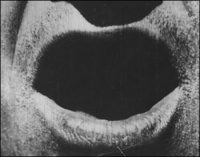Definition
From The Art and Popular Culture Encyclopedia
|
"Nothing is more usual than for philosophers to encroach on the province of grammarians, and to engage in disputes of words, while they imagine they are handling controversies of the deepest importance and concern." - David Hume "First of all, see if he [the analyst] has failed to make the definition through terms that are prior and more intelligible. […] accordingly, it is clear that a man who does not define through terms of this kind has not defined at all."--Topics (4th century BC) by Aristotle |

Illustration: a close-up of a mouth in the film The Big Swallow (1901)
|
Related e |
|
Featured: |
A definition is a concise statement explaining the meaning of a term, word or phrase. The term to be defined is known as the definiendum (Latin: that which is to be defined). The form of words which defines it is known as the definiens (Latin: that which is doing the defining). A definition may be a statement of the essential properties of a certain thing, or a statement of equivalence between a term and that term's meaning. The two are not mutually exclusive, nor are they equivalent.
Contents |
Etymology
Dēfīniō
Limitations of definition
Given that a natural language such as English contains, at any given time, a finite number of words, any comprehensive list of definitions must either be circular or rely upon primitive notions. If every term of every definiens must itself be defined, "where at last should we stop?"
A dictionary, for instance, insofar as it is a comprehensive list of lexical definitions, must resort to circularity.
Many philosophers have chosen instead to leave some terms undefined. The scholastic philosophers claimed that the highest genera (the so-called ten generalissima) cannot be defined, since we cannot assign any higher genus under which they may fall. Thus we cannot define being, unity and similar concepts. Locke supposes in An Essay Concerning Human Understanding that the names of simple concepts do not admit of any definition. More recently Bertrand Russell sought to develop a formal language based on logical atoms. Other philosophers, notably Wittgenstein, rejected the need for any undefined simples. Wittgenstein pointed out in his Philosophical Investigations that what counts as a "simple" in one circumstance might not do so in another. He rejected the very idea that every explanation of the meaning of a term needed itself to be explained: "As though an explanation hung in the air unless supported by another one", claiming instead that explanation of a term is only needed when we need to avoid misunderstanding.
Locke and Mill also argued that we cannot define individuals. We learn names by connecting an idea with a sound, so that speaker and hearer have the same idea when the same word is used. This is not possible when no one else is acquainted with the particular thing that has "fallen under our notice". Russell offered his theory of descriptions in part as a way of defining a proper name, the definition being given by a definite description that "picks out" exactly one individual. Saul Kripke pointed to difficulties with this approach, especially in relation to modality, in his book Naming and Necessity.
There is a presumption in the classic example of a definition that the definiens can be stated. Wittgenstein argued that for some terms this is not the case. The examples he used include game, number and family. In such cases, he argued, there is no fixed boundary that can be used to provide a definition. Rather, the items are grouped together because of a family resemblance. For terms such as these it is not possible and indeed not necessary to state a definition; rather, one simply comes to understand the use of the term.
See also
- Definitionism
- Definition of art
- Demonstration
- Extensional definition
- Fallacies of definition
- Indefinable
- Indeterminacy
- Intensional definition
- Lexical definition
- Redefinition
- Semantic
Template 'Defining' list
- Circular
- Concept
- Coordinative
- Enumerative
- Extensional
- Fallacies of
- Intensional
- Lexical
- Operational
- Ostensive
- Persuasive
- Precising
- Recursive
- Stipulative
- Theoretical
Whatlinkshere list
Definition - Fallacies of definition - Genus–differentia definition - Philosophical Investigations - Structuralist film theory - Archetype - Operational definition - Circular definition - Index of logic articles - Precising definition - New riddle of induction - Stipulative definition - Lexical definition - Theoretical definition - Autological word - Persuasive definition - Prague linguistic circle - Recursive definition - Private language argument - Haecceity - Church encoding - Cetiosaurus - Coordinative definition - Enumerative definition - Exemplification - Slender Man - Exemplification - John Lundberg - Pointing (disambiguation) - Conventionalism - Urban legends about drugs - Definitionism - Index of philosophy of language articles - Index of analytic philosophy articles - Plato's beard - Concept image and concept definition - Linda Dégh - Extensional and intensional definitions - Kevin de Queiroz - Pointing

